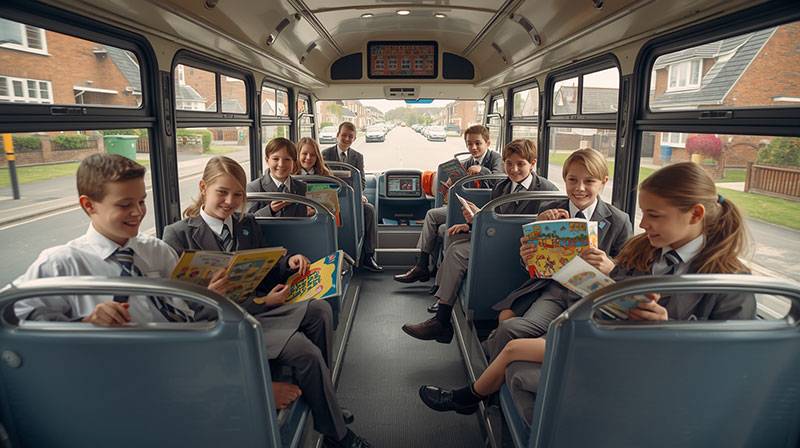Fun School Transport Activities That Keep Children Learning on the Go
School transport can be more than a means of getting pupils from one destination to another. With a little creativity, the time spent travelling can be turned into an extension of classroom learning. From short daily commutes to longer school trips, these journeys offer opportunities to build on lessons, strengthen social skills, and keep children engaged in a structured yet enjoyable way. Teachers and coordinators are increasingly recognising the potential of travel time, not only for entertainment but also for meaningful learning experiences.
Educational Games That Require No Materials
One of the simplest ways to keep pupils engaged during travel is through verbal activities that need no equipment. Teachers often find that games such as word associations, spelling challenges, or quick-fire memory activities work particularly well in a group setting. For schools that make use of large and small minibuses available to buy, these journeys can easily transform into mobile classrooms where learning feels like play.
Brain teasers, number games, and simple observation challenges help pupils revise knowledge while travelling. A vocabulary chain, where each pupil adds a word related to the last, can spark laughter and test memory recall. For younger children, counting games and rhyming challenges are a reliable way to keep energy positive and minds focused.
Observation and Memory Games
Observation-based activities make full use of the surrounding environment. Pupils can be asked to spot different shapes, colours, or types of vehicles during the journey. Memory games, where children recall what they have seen a few minutes later, encourage attention to detail and develop focus.
Activities linked to the immediate environment, such as noting road signs, spotting wildlife, or counting bicycles, also provide opportunities to reinforce classroom lessons in maths, literacy, and science. This keeps children engaged while building a stronger connection between what they learn in class and the world around them.
Learning Activities Linked to the Environment
Travel offers an excellent chance to apply geography and science knowledge. Teachers might guide pupils in identifying landmarks along the route or encourage them to keep simple journals where they record changes in weather, natural features, or seasonal shifts. Such activities nurture curiosity and support broader learning objectives in an interactive way.
Mathematics can be reinforced by estimating travel times, counting certain types of transport, or predicting patterns based on observations. Similarly, local history and design skills can be encouraged by asking pupils to describe older buildings or compare architectural features during trips. These real-world connections make subjects feel more relevant and memorable.
Group Activities That Build Collaboration
Team activities are ideal for promoting both social skills and learning during school journeys. Group quizzes allow pupils to test knowledge in a fun way, while collaborative storytelling exercises encourage creativity and active listening. Story chains, where each child adds a line to an ongoing tale, can bring groups together while improving language skills and confidence in speaking. You can find plenty of inspiring tales to use in such activities in our collection of short stories.
For younger children, singing number songs or practicing simple spelling through song keeps energy levels managed while building early learning foundations. Older pupils may enjoy more advanced tasks such as team problem-solving activities or mini debates about topics linked to their lessons.
Technology-Based Learning Opportunities
The use of digital tools can add variety to travel activities. Tablets loaded with educational apps or audio content provide focused engagement. Pupils can complete quizzes, listen to subject-related podcasts, or enjoy audiobooks during longer journeys.
Technology-led scavenger hunts are another option. Teachers can ask pupils to photograph certain landmarks, colours, or patterns during trips. The images can then be used in later lessons as part of discussions, presentations, or projects. With clear guidelines in place, digital tools can add structure and balance to learning on the go.
Activities Tailored to Different Age Groups
Different age groups respond to different types of activities, so tailoring them is important. Younger pupils benefit from short, simple games such as rhymes, counting challenges, or singing exercises. These hold attention and establish positive routines.
Children in the later years of primary school can handle longer, more complex activities such as storytelling games, spelling competitions, or mini science quizzes. Secondary students often prefer discussion-based tasks, logic puzzles, or analysis challenges that align with their subjects. Mixed groups work best with flexible tasks, such as buddy systems that pair older children with younger ones, ensuring participation for all ages.
Making Activities Easier to Deliver
Teachers and coordinators can simplify preparation by keeping activity kits on school transport. These may include cards with prompts, short worksheets, or storytelling cues. Kits can be updated regularly to reflect lesson topics and maintain pupil interest. A wide range of printable resources is available in our worksheets collection, which can be easily adapted for different activities.
Seating arrangements can also influence activity success. Facing small groups together encourages collaboration, while forward-facing rows work better for independent tasks. Horseshoe arrangements can be used for storytelling or group discussion, ensuring pupils can see one another and take part more easily.
Why Travel Learning Matters
Turning school transport into a learning environment helps ensure that time is not wasted and that pupils remain engaged even outside the classroom. These activities encourage teamwork, curiosity, and practical application of knowledge. The experience of learning in a moving environment also prepares pupils for adaptability and creativity in different contexts.
The benefits go beyond academics. Social skills, cooperation, and confidence all grow through group activities and shared tasks. Travel then becomes more than a commute; it becomes a platform for holistic learning and connection.


